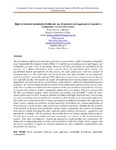Right to food and sustainable livelihoods: use of pastoral cycle approach to respond to communities’ needs isiolo county, Kenya

View/
Date
2018-04Author
Muthusi, Damaris
Arasa, Robert
Murag’e, Stephen
Metadata
Show full item recordAbstract
The constitution of Kenya provides that each and every person has a right to adequate and quality
food. Sustainable Development Goals (SDGs) 1, 2 and 6 focus on ending poverty and hunger, and
availability of clean water to all people. However, all these provisions are articulated in the
presence of a global environment under constant threat of degradation from extreme and
uncontrolled human development. In this context, the study underscores what the Laudato Si
document refers to: The earth must not live in poverty, and must therefore not be neglected,
exploited and left ecologically unkempt. While Africa has experienced economic growth in the past
two and half decades, the number of people still suffering from extreme hunger and poverty is
unjustified; and such growth has not facilitated comprehensive cushion for marginalized groups
of people. The Eastern region has failed to arrest the declining state of food security, and has even,
under the now phased out Millennium Development Goals, not articulated comprehensive strategy
to increase the resilience of their communities against hard core hunger. This is a contrast from
the West and Southern regions where, the former successfully achieved MDG 1 while the latter
seems headed there by 2020. In Kenya, millions of families still suffer food insecurity, and are thus
not able to maximize their potential and contribute to their families and communities effectively.
This study was carried out in Isiolo County, and aimed to a) build and strengthen the capacities of
Isiolo county residents on resilience to food insecurity; b) facilitate the creation and firming of
local advocacy actions on their right to food and c) promote alternative thinking like use of green
technological to increase food production among target communities and protect environment
from adverse global warming.The study employed mixed methods of research – qualitative and
quantitative techniques. The key findings showed that drivers of change shaping global progress
towards food security are multifaceted and communities are drivers to this transformational
journey. This study recommends a bottom-up approach to understanding the communities’ illbeing
and accompanying them to realize their potential to claim their rights; hence engage with
the service providers to supply the required amenities for their community transformation and
sustainable development.
